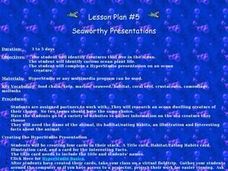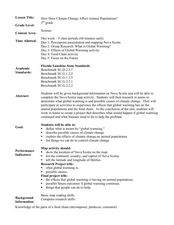Curated OER
Wild, Wild Wetland Wildlife
Students investigate biology by participating in a science experiment. In this dissection lesson, students conduct a nature field trip around their school grounds and identify animals, plants, tracks and waste. Students dissect an owl...
Curated OER
Biological Relationships - Coral Reef Memory Game and Chain Game
Students familiarize themselves with the interconnectedness of species within an ecosystem, and to use this knowledge to evaluate how the removal or decimation of one species can have far reaching effects.
Curated OER
Animals, Soil, Trees
Fourth graders describe the various kinds of soils and how plants and animals are affected by them. They describe the baic needs of plants, scoring at least a 3 or 4 on a 4-point rubic. Students are able to predict and/or infer what...
Curated OER
Spiders Catch Prey
Students see that spiders catch and eat their prey and are also caught and eaten by their enemies. They sort the pictures into animals that spiders eat, those they do not eat, and those that are spiders.
Curated OER
Cycles of Life in an Urban Habitat: Changes in Biodiversity
Second graders compare and contrast animate and inanimate objects. For this environmental science lesson, 2nd graders create simple food webs. They observe their environment and create a collage about it.
Curated OER
What is Cacao?
Students use the Internet to learn about the cacao plant. In this plants lesson, students complete a KWL chart on chocolate, learn about cocoa plants and discuss the parts of a plant. Students use the Internet to learn how the cacao...
Curated OER
The Future of Arctic Sea Ice
Learners research about the importance of sea ice to world climate and sea organisms. In this earth science lesson, students create a model of present and future Arctic sea ice communities. They discuss how ice melting affects...
Curated OER
Slow Food: A Different Path
Students investigate the slow food movement through a reading and activity. In this slow food lesson, students read about the differences in fast food and slow food and the ties to sustainable agriculture. They nominate a local specialty...
Curated OER
Activity 1: Please Pass the Energy, Food Webs in the Upper Ocean and Hydrothermal Vent Communities
Middle schoolers create food webs for two different ocean communities. They are given cards showing organisms from the surface of the ocean. They arrange them in order of who eats whom. After this class activity, students create a food...
Curated OER
What is a Raptor?
Learners explore, analyze and discover the characteristics of raptors and generate a word bank for owls and raptors. They identify attributes shared by raptors and practice various key vocabulary words to master and utilize in sentence...
Curated OER
The Tropical Rain Forest
Young scholars use various web sites to access information about the rain forest. They use the Tropical Rainforest Interactive CD to make their own rain forest pictures and stories and learn facts about the rain forest. They use various...
Curated OER
Pond Theme Unit
For this pond theme worksheet students research facts on pond life. Students complete comprehension questions, crosswords, word search, and math puzzles. Students write a short report.
Curated OER
Bats and Boas Abound
Students investigate Puerto Rican boa constrictors and bats. For this animal science lesson, students read an article about the bats and snakes found in Puerto Rico. Students use various art supplies to create a diorama of the habitat of...
Curated OER
Seaworthy Presentations
First graders research ocean animals and plants on the web. For this ocean habitat lesson, 1st graders prepare a multimedia presentation. Students will work on their presentations in pairs and every group should have its own animals or...
Curated OER
How Does Climate Change Affect Animal Populations?
Students investigate the effect of climate change on animal population in Nova Scotia. In this environmental science lesson, students complete a Nova Scotia map activity and research the causes of global warming in small groups. Students...
Curated OER
Animal Adaptations
Students focus on the pelts of fur-bearing animals native to Iowa to discover their different adaptations. In this animal adaptation lesson, students work in groups and examine various pelts to find information about the animals habitat...
Curated OER
Forest Food Webs
Students consider the interdependency of life in a temperate forest by studying selected organisms from an Asian temperate forest and creating a food web.
Curated OER
Food Webs
Young scholars produce a newspaper covering topics related to food webs. They use print and electronic sources to gather information about specific animals. They share their information with the class.
Curated OER
"Wet" Your Appetite: Conserving Water
Students investigate how water is utilized in producing food. In this agriculture lesson, students examine how much water goes into the creation of their daily menu. Students create a new menu that can conserve water and cut their water...
Curated OER
Energy Through the Ecosystem
In this ecosystem activity, learners use a diagram of an ocean-based food web to complete 5 short answer questions about the energy flow through this ecosystem.
Curated OER
Shark Attack Odds and the Importance of Sharks
Students examine an ecosystem. In this food web lesson, students discover the importance of sharks and what threat sharks actually pose to humans. They participate in class discussions and work independently on a couple of different...
Curated OER
Principles of Ecology
In this ecology worksheet, students will review 10 vocabulary words associated with the basic principles of ecology. This worksheet has 10 fill in the blank questions.
Curated OER
Composting
In this recognizing items that can be composted worksheet, students identify organic items that can be composted, write items that can be composted for each of the letters in the word compost, and make a list of vegetables and fruits....
Curated OER
Create a New Animal
Students understand what physical adaptations are and how they help an animal to survive. In this adaptations lesson, students research four animals and then make an original animal that has adaptations to make them survive.
Other popular searches
- Desert Food Chain
- Animal Food Chain
- Deciduous Forest Food Chains
- Pond Food Chain
- Ocean Food Chain
- Frog Food Chain
- Food Chains in Biomes
- Arctic Food Chain
- Desert Animal Food Chain
- Ocean Animals Food Chain
- Coral Reef Food Chain
- Marine Science Food Chain

























